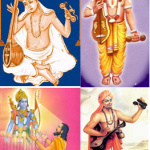In Srimad Bhagavad Gita, Bhagavan Sri Krishna says to Arjuna,
“nAham vedai: na tapasA na dAnena na chejyayA
shakya evam-vidho drashTum drshTavAn asi mAm yathA”
Neither studying the Vedas, nor severe penance, nor charity nor doing yaagaas can bestow one the ability to see me in the form that you are seeing.
Further, Bhagavan adds that the sole reason Arjuna could see Bhagavan is because of His ananya bhakti. “bhaktyA tu ananyayA shakya…”
 What is this ananya bhakti? “Anya” means others, “ananya” therefore means “na anya” (no others). One-pointed devotion towards Bhagavan is ananya bhakti. This ananya bhakti can manifest in five different ways. We see these reflected in the various Madhurageethams of Sri Swamiji. In these simple yet profound words of Sri Swamiji, we find all the flavors of Ananya bhakti. It is by holding on to the Madhurageethams that we shall attempt to understand the five different shades of Ananya bhakti.
What is this ananya bhakti? “Anya” means others, “ananya” therefore means “na anya” (no others). One-pointed devotion towards Bhagavan is ananya bhakti. This ananya bhakti can manifest in five different ways. We see these reflected in the various Madhurageethams of Sri Swamiji. In these simple yet profound words of Sri Swamiji, we find all the flavors of Ananya bhakti. It is by holding on to the Madhurageethams that we shall attempt to understand the five different shades of Ananya bhakti.
1. No other refuge other than my Bhagavan
The fundamental belief in ananya bhakti is that Bhagavan (my ishTa deiva, in the form that I worship Him) alone is the sole refuge (ananya Ashrayam). A devotee relies solely on Bhagavan’s Grace and nothing else. Let us say, there is a one-pointed devotee of Krishna. When he is in a crisis, such a devotee will seek only the feet of Bhagavan Krishna and pray to Him. He will not visit multiple temples or do various pujas or homas. He will seek only his ishta deiva and pray to Him alone.
Sri Swamiji shows us this shade of bhakti in the Madhurageetham – “un aruL anDri vEronDrum ariyene kaNNa…” Oh Krishna, I do not know anything other than Your Grace!
Further, He tells Bhagavan, “vEroru dheivatthai nAn ariyAdhadhAl, vEroru dheivamum enai ariyAdhu”.. Since, I do not know any other deity, no other deity knows me either.
2. Not expecting any other fruit/reward
Secondly, in ananya bhakti, the devotee does not expect anything (reward or fruit) other than Bhagavan. When we seek Bhagavan only for His sake and nothing else, that pleases Bhagavan immensely.
Initially, when we start our journey in the path of spirituality, Bhagavan may bestow good health, long-life, wealth, status, power, family, education and so on. An intelligent devotee will consider them as distractions and instead, continue seeking Bhagavan. When a devotee persists in his devotion to Bhagavan, then eventually Bhagavan reveals Himself to the devotee.
Sri Ramakrishna Paramahamsa, a great Mahatma who lived in the 19th century explains this with a simple example. Let us say, there is a mother who has a small child. She has a lot of work to do and therefore distracts the child with toys. If the child is amused by the toys, she lets it enjoy them, and continues with her work. Whereas, if the child throws away the toy and continues to cry for her, then eventually she picks up the child and carries him in her arms. Likewise, if we get distracted with the world, Bhagavan lets us enjoy it. On the other hand, if we too seek Bhagavan like that child, then Bhagavan who is our eternal Mother and Father, reveals Himself and blesses us with His presence.
Sri Swamiji regards our dear Radha Rani as his mother and like a child wanting only the mother, He too prays only for Her Love. He sings, “thAye nAn un sei allava…” O Mother, am I not your child? In that Madhurageetham, he further sings, “paNam vEnDAm pugazh vEnDAm..” I do not want money, I do not want fame, and so on. And, finally he reveals, what is it that he is truly longing for. “un anbu onDrirkkE EngugiNDren”.. I long only for Your Love.
3. No one else other than Bhagavan
The third aspect of ananya bhakti is a state that is possible only for jnAnis. Jnanis are bhaktas too. They see Bhagavan everywhere and nothing else is visible. This is the state Sri Shuka muni was in. Sant Namadev, Sant Eknath and many others were also in this state.
Sri Swamiji’s Madhurageethams reflect this state of Sri Swamiji. In the kirtan, “kANbadellAm kaNNan mayamE…” Sri Swamiji says, everything he sees is Krishna.
4. All objects in this creation remind of Bhagavan
The next state of ananya bhakti is one where anything a devotee sees reminds him of Bhagavan. There is a subtle difference between the previous type of ananya bhakti and this. In the previous case, the devotee sees everything as Bhagavan. Nothing else exists for him. On the other hand, in this current state, the devotee is able to see the various objects in this creation. The various objects that he sees reminds him of Bhagavan.
For example, in one of the pasurams, Nammazhwar as the mother of “Vakulaabara Nayaki” (his bhAva of a devotee in mAdhurya bhAva towards Bhagavan) says that when her daughter sees the ground, she is immediately reminded of Bhagavan Vamana who came and measured the Earth. When she looks up and sees the sky, she is immediately reminded of the Lord in Vaikunta.
In Srimad Bhagavatam, Sri Veda Vyasa starts by asking us all to meditate on the Supreme Truth (satyam param dhImahi). In that same sloka, he refers to the creation of Bhagavan citing the three elements fire, water and earth (tejo vAri mruthAm). He mentions these three elements because it is only these elements that can be physically seen with the eyes. In a Madhurageetham too, Sri Swamiji makes a similar reference. In the kirtan, “dIpa jyothiyile vEnkaTEshan..” Sri Swamiji refers to these three elements and sings that these remind him of Lord Venkatesha. Deepa jyothi refers to the radiance of the lamp or fire. In the next line, Sri Swamiji says, the lotus pond (tAmaraikulam thanil vEnkaTEshan..) reminds Him of Lord Venkatesha. Here the reference is to the element water. Finally, he sings, “tuLasi vanam thanil vEnkaTEshan”. Here, the reference is to tulasi forest which represents earth.
5. No other Sadhana
The fifth type of ananya bhakti is that the devotee relies on no other sAdhana or spiritual practice. He relies only on the Grace of Bhagavan. This does not mean that he does not undertake any spiritual activity and leads a lazy life. He lives a life that pleases his Bhagavan and engages in spiritual activities to the extent he can. The difference is, that though he engages in spiritual activities, he does not rely on it to attain liberation. He does them for Bhagavan’s pleasure and to involve his senses and organs in Bhagavan’s service. For spiritual attainment, he relies only on the Grace of Bhagavan.
Sri Swamiji shows this shade of bhakti in the Madhurageetham – “karuNai onDrE AdhAramAm kaNNa..” set in Sindhubhairavi raga. In that, he sings, “ivvulagirkum maruvulagirkum..” I rely on only your Grace to survive both in this world and in the world beyond.
Admire all, Adopt One!
It is important to remember that Ananya bhakti is not narrow-mindedness. It is the grandest philosophy. Just as a chaste woman showers her love only on her husband and treats his relatives and friends with respect, similarly, the one-pointed devotee showers all his/her only on his/her ishta deiva and treats all other deities with respect. Ananya bhakti does not condone disrespecting other faiths in the name of single-pointed devotion. The philosophy of “Admire all, Adopt One!” reflects the spirit of ananya bhakti. We must respect all paths yet stay steadfast in one.
Once a disciple of Sri Ramana Maharshi, visited another Mahatma’s ashram. When he came back, Sri Ramana Maharshi asked him if he had prostrated to the Mahatma in the ashram. The disciple replied in the negative and said that he considered Bhagavan Ramana alone to be his Guru and therefore did not prostrate to the other Mahatma. Immediately, Ramana Maharishi said that when he had gone to the other mahatma’s ashram, he must prostrate to him and pay his respects. He said that the devotee could see his Guru in all mahatmas and prostrate to them.
Respect for all faiths is fundamental to ananya bhakti. At the same time, immense one-pointed love for our own is what defines ananya bhakti.
Sowmya Balasubramaniam, Dublin CA
Excerpted from on Bhagavad Gita Bhakti Yoga talks by Sri Ramanujamji, disciple of HH Maharanyam Sri Sri Muralidhara Swamiji
Click here to go back to the February 2023 newsletter page:
https://godivinity.org/newsletters/nama-dwaar-newsletter-february-2023/






